More than 8,000 refugees live in mid-Missouri. They’ve fled persecution and danger from around the world and taken their families across borders and oceans. They’ve ended up in the middle of America. For them, success comes from the community that takes them in.
“I define connection as the energy that exists between people when they feel seen, heard, and valued; when they can give and receive without judgment; and when they derive sustenance and strength from the relationship.”
— Brené Brown, researcher and author
_______
Cing Cing Hlamyo was five months pregnant with her second child when she and her husband, Pau, stepped off of a plane in Columbia. They had traveled for days with a toddler in tow, starting in Malaysia with stops in Japan, Los Angeles, and Memphis. But their journey had started four years earlier, in Burma.
Pau and Cing Cing had been married only a short time when Pau was forced into working for the ruling Burmese military. Faced with the prospect of lifelong slavery, the young couple made a choice. “He had to leave, and I didn’t want to be alone in Burma,” Cing Cing recalls. So they left their families and fled across the border into Malaysia, where they began life as refugees.
150 refugees are resettled in mid-Missouri annually, and there are more than 8,000 currently living in the area. While each one has a unique story, they all share some common experiences in the new community they now call home.
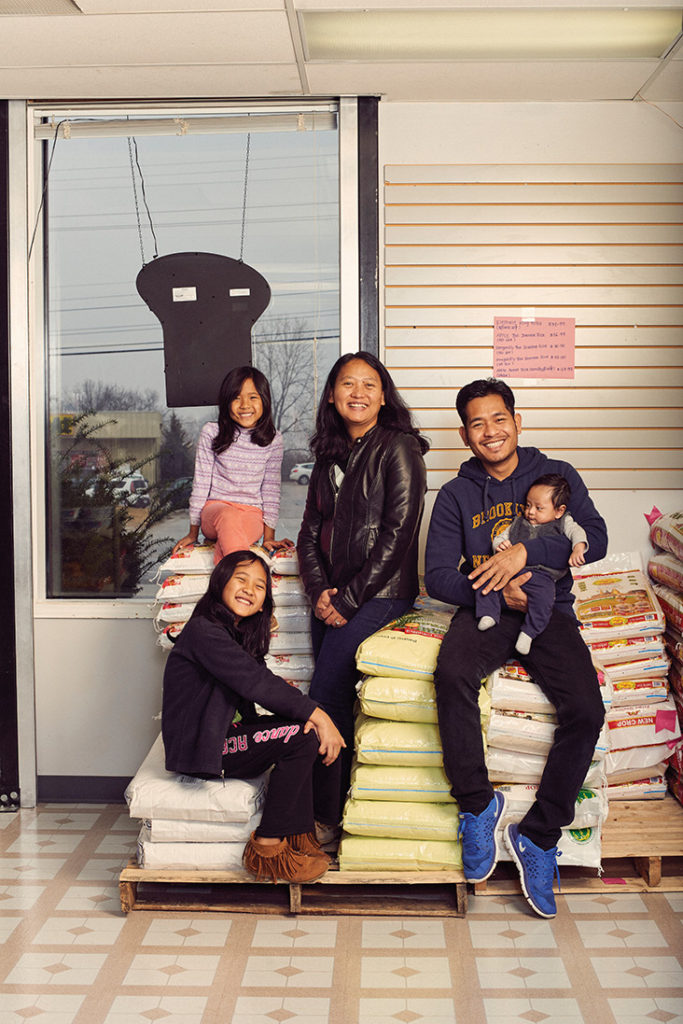
Disorientation, Reorientation
Barry Stoll is the director of City of Refuge, an organization providing aid to refugees in mid-Missouri. As such, he knows the ins and outs of the rigorous screening process people must go through before they can be classified as refugees. Stoll says: “The vetting process, despite what some people may think, is extremely thorough. So a few get to make it over here from their respective countries.”
Getting cleared to enter the United States as a refugee takes an average of 18 to 24 months. For Cing Cing and Pau, it took four years. While they waited for the United Nations Human Rights Council to check their story and classify them as refugees, they worked at a restaurant, picking up a smattering of English, Malay, and Chinese. It was a stressful time.
“We didn’t have passports in Malaysia,” Cing Cing explains. “If you didn’t have passports, anytime, the police could come and take you to the jail. And so all the time we had to look around, worry. After we got into the United States, we already had the right documents. We had everything, so we didn’t have to worry. But even then, sometimes, if we heard a police car, we were scared.”
Pam Ingram, who runs Granny’s House, an after-school program for children in public housing, says this lingering anxiety is common among the refugees she works with, many of whom have fled genocide, war, and decades-long stays in refugee camps. “When you have a population of people who live their lives in 911 mode, so to speak, they have a lot of PTSD and emotional or mental health needs,” Pam says. “But who can help them if you don’t know their language and their culture?”
About 80 percent of the young people in the Granny’s House program are African refugees. “Mostly from Rwanda, Burundi, Tanzania, Congo, Liberia, Sudan . . . I counted 12 countries one day,” Pam says. “I know there are some I’m forgetting.” She also works with families from Iraq, Pakistan, and other Middle Eastern nations.
Many arrive without much more than the clothes on their backs and a few precious yet portable mementos from happier times, often articles of traditional clothing. Workers from Refugee and Immigration Services, an arm of Catholic Charities that partners with the federal government, meet refugees at the airport and take them to an apartment or house, with rent covered for about six months. During that time, says Barry, “they have to learn English, get a job, get a driver’s license, get a car, get to where they can pay for housing.”
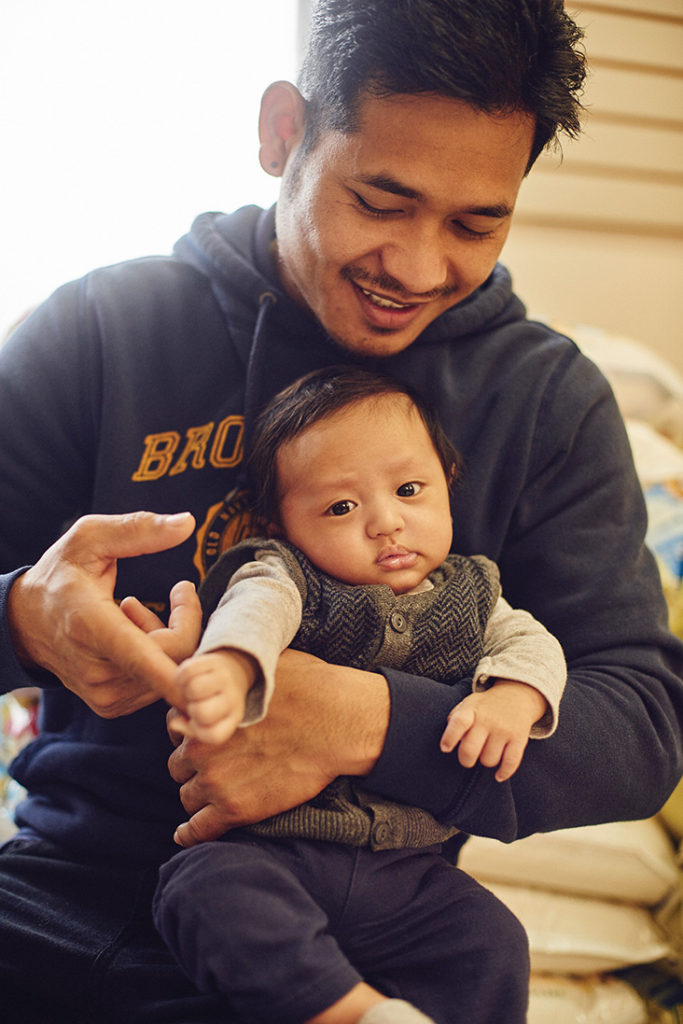
The transition is more or less jarring depending on the person’s life before displacement. Those who come from metropolitan areas, like Baghdad, already know some English and grew up with electricity and other modern amenities. “But some folks know zero English,” Barry explains. “They’ve never been around electricity, plumbing, because for the last 20 years they’ve been in a refugee camp. For those folks, the prospect of getting settled in a couple of months is completely impossible.”
Local organizations like Granny’s House and City of Refuge connect with families to help with the transition over the long term. City of Refuge provides a range of services, from English tutoring to job placement. Its founder, Jen Wheeler, wanted to expand services beyond her originally for-profit cleaning company, Safi Sana, which she created to provide employment for refugees while they learned English. Pau Hlamyo was Safi Sana’s first full-time employee.
Granny’s House works with many refugee children, giving them a place to forge positive peer relationships and get help with school work. Pam says, “We try to avoid anything that would make it look like we’re trying to be ‘knights on the white horses.’ We interact with people and see that they have so much to offer. They have needs, but they have a lot of beautiful things to offer. Their resilience, their work ethic, the children’s gratitude is amazing.”
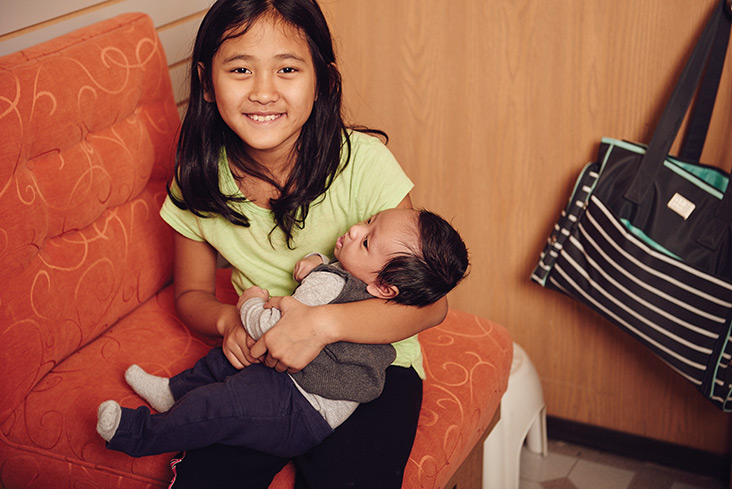
Mother of Nations
Refugee children tend to learn English quicker than their parents through the immersion of attending school. But because of the trauma many refugee children suffer, some require individualized education plans, and parents aren’t always able to converse effectively with teachers and administrators. The language barrier can lead to confusion, frustration, and struggling children. For Columbia’s African refugees, Caritas Habimana steps in to fill the communication gap.
Officially, Caritas works as an interpreter for several organizations, including Columbia Public Schools and the Family Health Center. But virtually every person connected to the refugee community in Columbia will tell you that Caritas is much more than an interpreter. “[Refugee families] really need a lot of advocates,” Pam says, “and Caritas is one of their main ones.”
Caritas understands the struggles of refugees because she was a refugee herself. In her native Rwanda, Caritas was a teacher at the French embassy, and her husband worked for Doctors without Borders. “We had a good living,” she says. “We were stable. We had a house. We accomplished everything people need to accomplish. We had children. It felt like life would go on.”
But the horrors of the Rwandan civil war shattered that life. During the genocide in 1994, Caritas escaped with some of her siblings into Uganda. Her mother and many other family members were killed. “I didn’t have my children,” she says. “I didn’t know where anybody was. We just ran apart.” Months later, she was reunited with her children and husband in Kenya, and the family was, eventually, cleared for resettlement in the United States.
Caritas says it’s easy for some to forget that refugees are ordinary people, impacted by circumstances outside of their control. “I should be in Rwanda right now,” she says. “I had a normal, good life. I wasn’t rich, but it was my life. My life wasn’t bad. It can happen to anyone. That’s something everyone should understand.”
Caritas and her family adjusted to American life, but it was 15 years before she found her calling. One day, she saw a family leaving Gerbes with groceries balanced on their heads. She instantly recognized them as Africans. Caritas says, “I approached them, and [it turned out that] I speak the same language as them. So we became friends. I said, ‘Where are you going? Where do you live?’ And they took me to their house.”
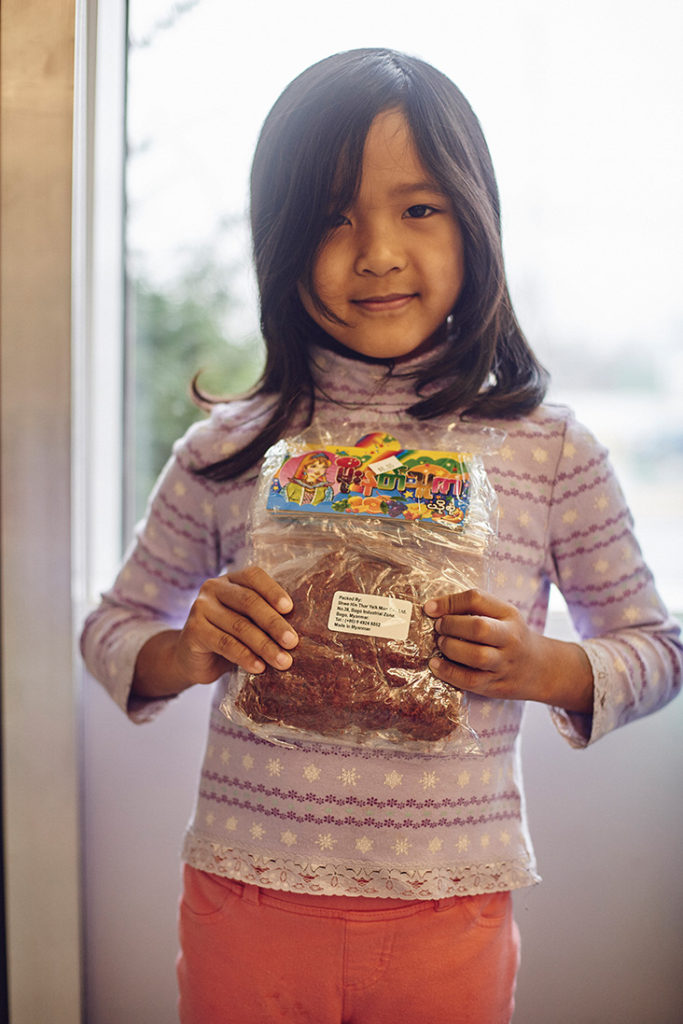
At the house, it was clear that the family needed help. “The meat was on the counter, tomato sauce in the fridge,” she says. “They didn’t know how to turn on the range. It was too much.” One of the children had a high fever. Caritas helped the family find a doctor, and it turned out that the child had meningitis.
Helping her new friends required a lot of Caritas’ attention. “I would leave my job, which was day care, at six o’clock, and then I would stop by and check on them.” She read their mail to them, she says, “and reading the mail leads me to do this, and doing that, and doing that — I quit my job. I said, I’m quitting this job. Because if I didn’t quit the job, somebody was going to die, and [one day] God will ask me if I was aware of it.”
Caritas picked up more flexible jobs to cover her bills, mostly through her new work with the refugee families. She has a gift for languages, and over the course of her life she has learned many: Kinyarwanda (her native language), Swahili, Kirundi, Lingala, French, and English. One of her interpreting jobs is with Sherryl Laws, a social worker who helps refugees in the area. Caritas translates for Sherryl’s African clients. For a time, Cing Cing Hlamyo did the same for Burmese clients.
“I have jobs here and there,” Caritas says, “but most of the time, I’m not working for money, I’m volunteering.” Her planner is so full of appointments and meetings for her refugee friends that when her friends wanted to take her out for her birthday in November, she said no. “Sorry! This year, I’m not growing up.”
She drives people to doctor’s appointments, helps them apply for housing and other necessities, and holds their children accountable in school. Pam Ingram says: “Every Granny’s House kid’s mother, father, teacher, counselor, doctor, has Caritas’ number on speed-dial. I couldn’t do what I’ve done with refugee families without Caritas. If I have a problem and have to talk to the parents, I’ll call her and have her translate.”
Caritas acknowledges that her workload is enormous, and she says God gives her unexpected breaks when she starts to feel burned out. What makes it all worth it, though, is seeing refugee families thrive through community. “It’s like we became brothers,” she says.
A woman Caritas has been helping recently found out that her mother had been killed in Africa. Not long after, the woman had a miscarriage. Other families gathered to cook meals for her and raised money to help her in her time of need. Caritas often thinks about struggles like this in the refugee community and the role they play in their new lives.
“Sometimes I sit down and think, This is something good that has happened,” she says. “Refugees are here together. It’s something big. It’s powerful . . . children are growing. They are going to college. It’s beautiful.”
All this volunteer work, Caritas says, “makes me feel good, because you have to have a start. I’m proud of them. They are hard workers. They work, they take care of their families, and I don’t see anything negative about them.”
Barry Stoll says that no matter where the refugees come from, their drive to work and provide a stable life for their families in this new place is a thing to behold. He says: “My wife is always getting calls from [employers] saying, ‘When are you going to bring us some more refugees?’ It’s part of what I’m trying to communicate to the community: Hey, there’s a labor force, there’s a work ethic among us that we need to tap.”
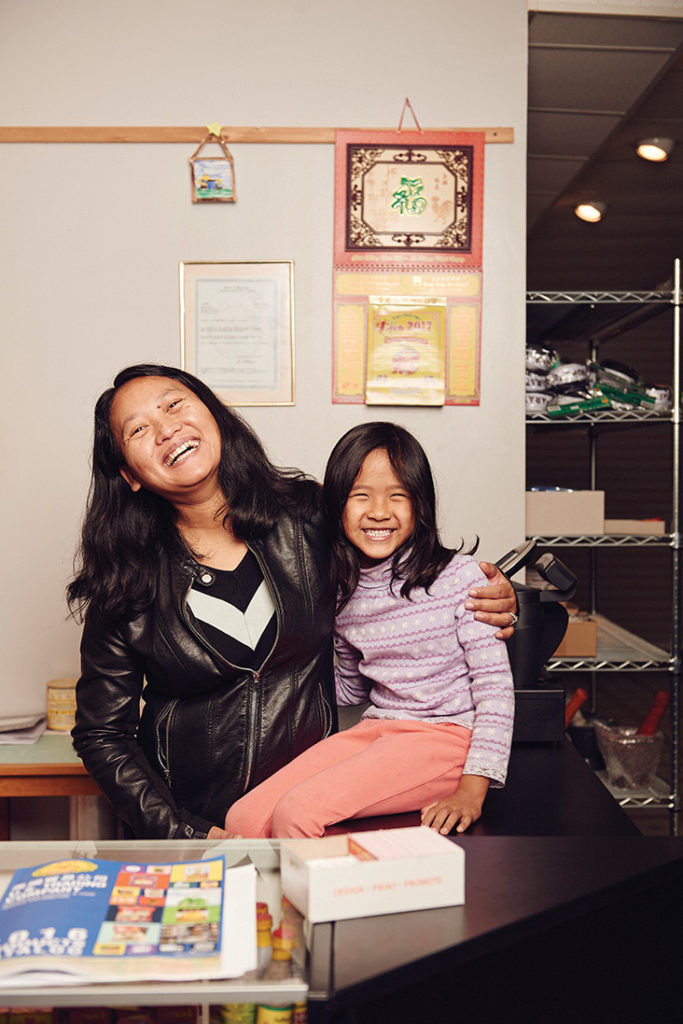
Here to Stay
Cing Cing and Pau have lived in Columbia for seven years now. Their daughters, Kimnu and Mawi Mawi, attend Christian Fellowship School, and Cing Cing gave birth to a son, Thiha, in November. Pau works at Columbia’s Kraft plant, and, on his days off, he helps Cing Cing at her new business: an international food market.
Cing Cing’s idea for the store came from an all-too-American problem: struggling to find a work–life balance. “I want to stay with my kids,” she says. “I want to work, but, at a company, I don’t have time to spend with my kids. So I thought, if I had my own business, I would be able to hang out with my kids.”
Barry helped Cing Cing bring her plan to fruition. “When I have to go to an office or I have to go to Jeff City, he’s with me,” she says. “I didn’t understand about everything — the license for the business, the bank account. I only just wanted to open a business. So I can’t stand without Barry.” As she says this, Barry and Pau carry sacks of rice into the store and stack them along the front wall.
Cing Cing has started importing products directly from Burma, which she and other refugees couldn’t find elsewhere in Columbia. The shelves of Shwe Market are full of products from around the world. “It’s all kind of mixed in, but the things especially from Burma, we put them in one place. And they come — Burmese, Cambodians, Americans, they come and look.”
Cing Cing and Pau miss their families in Burma and plan to visit soon. They had hoped for a trip in 2016, but life — namely, baby Thiha’s impending arrival — got in the way.
Caritas has returned to her beloved Rwanda twice, and she’s overjoyed at the healing she has seen there. Her most recent trip was to attend the opening of a women’s counseling center, founded by her sister and named after their mother.
“I want people to be aware of who the refugees are, because of the politics right now and all of this going on,” says Caritas. “I’m aware that people don’t know. Who is the refugee? Where did [they] come from? Who is this person? That’s what people should understand. Because once you know them, I see that love.”


